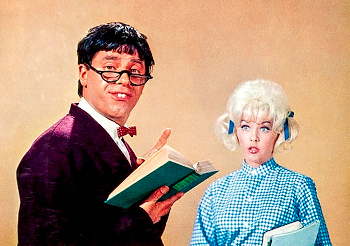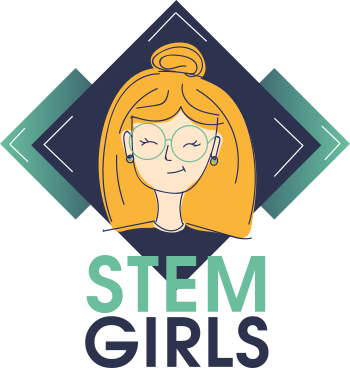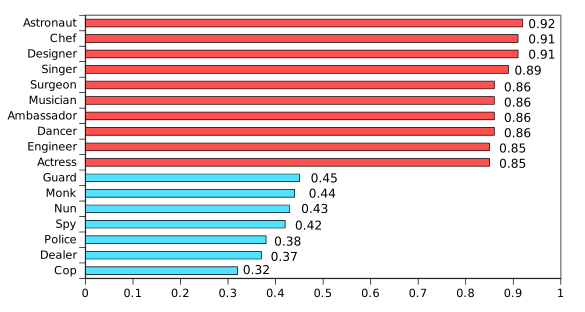Portrayal of Professions
August 1, 2022
As a
young recipient of a
commercial radio operator license (A
First Phone; but, more accurately, a
General Radiotelephone Operator License, First Class), I had a
summer job at a major
television station as a
control room engineer. My responsibilities were to manage the flow of program material from many sources that included the
NBC television network,
commercials stored on
videotape and
film, and the
afternoon movie. As a benefit, I got to watch
color television at work in 1967 on an
expensive Conrac monitor when color television was still rare.
The benefit wasn't all that great, since
daytime television fare was
soap operas, most of which involved the
personal lives of
professionals such as
medical doctors and
lawyers. The
antics of such people were thought to be more interesting than the lives of
common people, such as
broadcast engineers. What impressed me most was the fact that all these people seemed to have
a lot of money and do no
work at all. As they say, "
It's nice work if you can get it." Some of my
high school classmates became lawyers, possibly being influenced by the
media depiction of this
profession.
Albert Einstein (1879-1955) became a
cultural icon of
science in the
20th century, but
scientists were portrayed quite differently in early films and television.
Mad scientists and
evil scientists were predominant, and there were the occasional
eccentric and
nutty professor types, such as the
Fred MacMurray (1908-1991) portrayal in the 1961 film,
The Absent-Minded Professor,[1] the
Cary Grant (1904-1986) portrayal of a corporate research scientist in the 1952 film,
Monkey Business,[2] and the
Jerry Lewis (1926-2017) portrayal in the 1963 film,
The Nutty Professor.[3]

Jerry Lewis (1926-2017) and Stella Stevens (b. 1938) in a promotional photograph for "The Nutty Professor."
A popular film is often remade, and this was the case when Eddie Murphy (b. 1961) starred in the 1996 version, The Nutty Professor.[4]
One difference in the films is that the Jerry Lewis character is Julius F. Kelp, and the Eddie Murphy character is Sherman Klump. However, in each case their suave alter ego is Buddy Love.
(Cropped Wikimedia Commons image.)
In some cases this
fictional portrayal of
oddball scientists wasn't far from the
truth. One of my
undergraduate friends had a popular
stand-up routine in which he
parodied the
behavior of some of our professors. This was good
training for me in later life when I was a
lecturer to
chemistry undergraduates and I often caught myself in such
bad habits as talking to the
blackboard and not to the students.
Another bad habit was omitting some
obvious steps of a
process. Obvious, perhaps to me, but not to a
freshman chemistry student. And, yes,
marking "on the curve" was indeed necessary, the "curve" being quite
accurate even in those days before
ubiquitous computing because of my
mathematics training. As I explained to my students, a
bad test is one in which too many students score close to 100%; so, the tests are difficult, and
statistical grading is necessary.
Three
computer scientists from the
Signal Analysis and Interpretation Laboratory of the
University of Southern California (Los Angeles, California) have recently
published an
open access paper in
PLOS One in which they use
computational text analysis to examine the portrayal of professions in
entertainment media, including their frequency of appearance and
sentiment trends.[5-7] In their analysis of 136,000 films and television shows, they found that mentions of
manual labor and
military professions have decreased, while mentions of
sports and entertainment occupations have increased.[5,7]
As the
authors explain,
conversations with their
research funding agency, the
U.S. Chamber of Commerce Foundation, revealed the need for an analysis of how professions are depicted in the media.[8] It's acknowledged that such depictions influence
beliefs,
actions, and
behaviors, and that includes career choice.[8] As examples,
Mad Men prompted many to enroll in
advertising courses; the movie,
Top Gun, led to a 500% increase in
US Navy recruitment; and the
Dana Scully character on
The X-Files inspired
young women to enter
STEM fields.[5,7]

A STEM Girls logo submitted for a 2019 contest about Ukrainian Women in STEM.
As of 2021, Nobel Prizes have been awarded to 58 women, but only 25 of these are in STEM fields.
Seven (3.7% of 188) have won the Nobel Prize in Chemistry, four (1.8% of 219) have won the Nobel Prize in Physics, twelve (5.4% of 224) have won the Nobel Prize in Physiology or Medicine, and two (2.2% of 89) have won the Nobel Memorial Prize in Economic Sciences.
(Wikimedia Commons image by Elizabeth Gaphich.)
The number of film releases increased by 4% in 2019, and people in the US watched television for around 4 hours a day.[5] It's no wonder that media influences our view of life, including
career choice.[5] A
survey of 1,005 employed people in the US found that 58% of these attributed their career
inspiration to some
book, TV show, movie,
podcast, or
video game.[5]
This study was limited to US and
United Kingdom media with
subtitles, since these were most easily
searched.[7] The study
authors created a searchable
taxonomy of professional groups and developed a
corpus of 4,000 mentioned professions spanning more than 136,000
Internet Movie Database titles over nearly seven
decades from 1950 to 2017.[5,7] The frequency and trend in sentiment for these different occupations was examined, as well are their
correlation with actual
employment statistics.[5]
Analyzing these many decades of television and film subtitles revealed that
sales-related professions were least regarded, whereas
architecture and
engineering were the most positively portrayed professions.[7] The frequency of media mentions of job titles was correlated with real-world employment statistics of their corresponding professions,[5] but there were decreased mentions of
manual labor and
military occupations and increased mentions of
sports,
arts, entertainment, and STEM occupations.[5,7]
Medical doctors, lawyers, and
police showed increasing negative trends over time, whereas
astronauts,
engineers,
detectives,
therapists,
musicians, and
singers had more favorable mentions.[5,7]
Specialized medical professions, such as
cardiologists,
gynecologists, and
neurologists had increased mentions, while
generic terms like doctors and
nurses decreased.[7]
Gender-neutral terms, such as
flight attendant instead of
stewardess, became more frequent (see figure).[7]

Still images from a 1971 National Airlines 'fly me' commercial. Left to right, Dianne, Kerry, and Marissa. This commercial was part of a controversial National Airlines advertising campaign that featured airline stewardesses and the suggestive tagline, "Fly Me." Several airlines used this "sex sells" approach in the 1960s and 1970s. Interestingly, National Airlines was forced to shut down for several months in 1975 due to a strike by flight attendants. Fly Me was also the title of a 1973 film with the tagline, "Stewardesses battle kung fu killers."[10] (National Airlines Commercial: "Fly Me" (1971), YouTube video from the The Pan Am Museum Foundation.[9])
Says study author and University of Southern California
professor,
Shrikanth Narayanan, "
AI provides a quick and fast way to
quantify social trends in movies and TV over time. In this particular study, we are able to understand sentiment towards a host of professions. It is interesting to note that the careers on screen
dovetail with real-life trends in employment."[7]
Support for this research came from an
award from the
U.S. Chamber of Commerce Foundation.[7]

Top ten positively considered professions (red) and the seven most negatively considered professions (blue). (Created using Gnumeric from data in ref. 7.[7] Click for larger image.)
References:
- The Absent Minded Professor (1961), Robert Stevenson, Director, on the Internet Movie Database.
- Monkey Business, 1952, Howard Hawks, Director, on the Internet Movie Database.
- The Nutty Professor, 1963, Jerry Lewis, Director, on the Internet Movie Database.
- The Nutty Professor, 1996, Tom Shadyac, Director, on the Internet Movie Database.
- Sabyasachee Baruah, Krishna Somandepalli, and Shrikanth Narayanan, "Representation of professions in entertainment media: Insights into frequency and sentiment trends through computational text analysis," PLoS ONE, vol. 17, no. 5(May 18, 2022), Article no. e0267812, https://doi.org/10.1371/journal.pone.0267812. This is an open access paper with a PDF file here.
- Code and data repository for "Representation of professions in entertainment media: Insights into frequency and sentiment trends," ref. 5.
- How on-screen representations of professions have changed over 70 years, PLOS Press Release, May 18, 2022.
- Interview with Sabyasachee Baruah (PhD Student, Computer Science, University of Southern California), Krishna Somandepalli (Software Engineer, Google), and Shrikanth Narayanan (University Professor and Nikias Chair in Engineering, University of Southern California), authors of ref. 5 (3 page *.docx file).
- National Airlines Commercial: "Fly Me" (1971), YouTube video from the The Pan Am Museum Foundation.
- Fly Me (1973), Cirio H. Santiago, Jonathan Demme, and Curtis Hanson, Directors, on the Internet Movie Database.
Linked Keywords: Youth; young; commercial radio operator license; General Radiotelephone Operator License, First Class; seasonal industry; summer job; television station; production control room; broadcast engineering; broadcast engineer; NBC; television network; television advertisement; commercial; videotape; photographic film; afternoon; movie; color television; cost; expensive; Conrac monitor; daytime television in the United States; soap opera; personal life; professional; physician; medical doctor; lawyer; antic; commoner; common people; wealth; a lot of money; wage labor; work; It's nice work if you can get it; high school; classmate; mass media; depiction; profession; Albert Einstein (1879-1955); cultural icon; science; 20th century; scientist; mad scientist; James Bond villain; evil scientist; eccentricity (behavior); eccentric; professor; Fred MacMurray (1908-1991); The Absent-Minded Professor (1961 film); Cary Grant (1904-1986); Monkey Business (1952 film); Jerry Lewis (1926-2017); The Nutty Professor (1963 film); Stella Stevens (b. 1938); advertising campaign; promotional photograph; popularity; popular; film; remake; remade; Eddie Murphy (b. 1961); The Nutty Professor (1996 film); suave; alter ego; Wikimedia Commons; fiction; fictional portrayal; oddball; truth; undergraduate education; friendship; friend; stand-up comedy; stand-up routine; parody; parodied; human behavior; behavior; training; academic lecturer; chemistry; bad habit; blackboard; process; freshman; norm-referenced test; marking "on the curve"; accuracy and precision; accurate; ubiquitous computing; mathematics; assessment test; statistics; statistical; computer scientist; Signal Analysis and Interpretation Laboratory; University of Southern California (Los Angeles, California); scientific literature; publish; open-access journal; open access paper; PLOS One; content analysis; computational text analysis; entertainment; public opinion; sentiment; trend; manual labor; military; sports; author; conversation; funding of science; research funding agency; U.S. Chamber of Commerce Foundation; belief; action (philosophy); behavior; Mad Men; advertising; Top Gun; United States Navy; military recruitment; Dana Scully; character (arts); The X-Files; young women; STEM fields; female Nobel laureates; Nobel Prizes have been awarded to 58 women; Nobel Prize in Chemistry; Nobel Prize in Physics; Nobel Prize in Physiology or Medicine; Nobel Memorial Prize in Economic Sciences; career; statistical survey; inspiration; book; podcast; video game; United Kingdom; subtitle (titling); search algorithm; search; author; taxonomy; text corpus; IMDb; Internet Movie Database; title (publishing); decade; correlation; employment statistics; sales; architecture; engineering; manual labor; arts; police; astronaut; detective; therapist; musician; singer; medical specialty; Specialized medical profession; cardiology; cardiologist; gynaecology; gynecologist; neurology; neurologist; generic; nursing; nurse; gender-neutral language; gender-neutral term; flight attendant; stewardess; screenshot; still image; National Airlines; television advertisement; commercial; controversy; controversial; advertising campaign; airline; innuendo; suggestive; tagline; sex in advertising; sex sells; 1960s; 1970s; strike action; Fly Me; title (publishing); film; Chinese martial arts; kung fu; murder; killer; National Airlines Commercial: "Fly Me" (1971), YouTube video from the The Pan Am Museum Foundation; Shrikanth Narayanan; artificial intelligence; AI; quantification (science); quantify; lifestyle trends and media; social trend; dovetail; grant (money); award; U.S. Chamber of Commerce Foundation; Gnumeric.